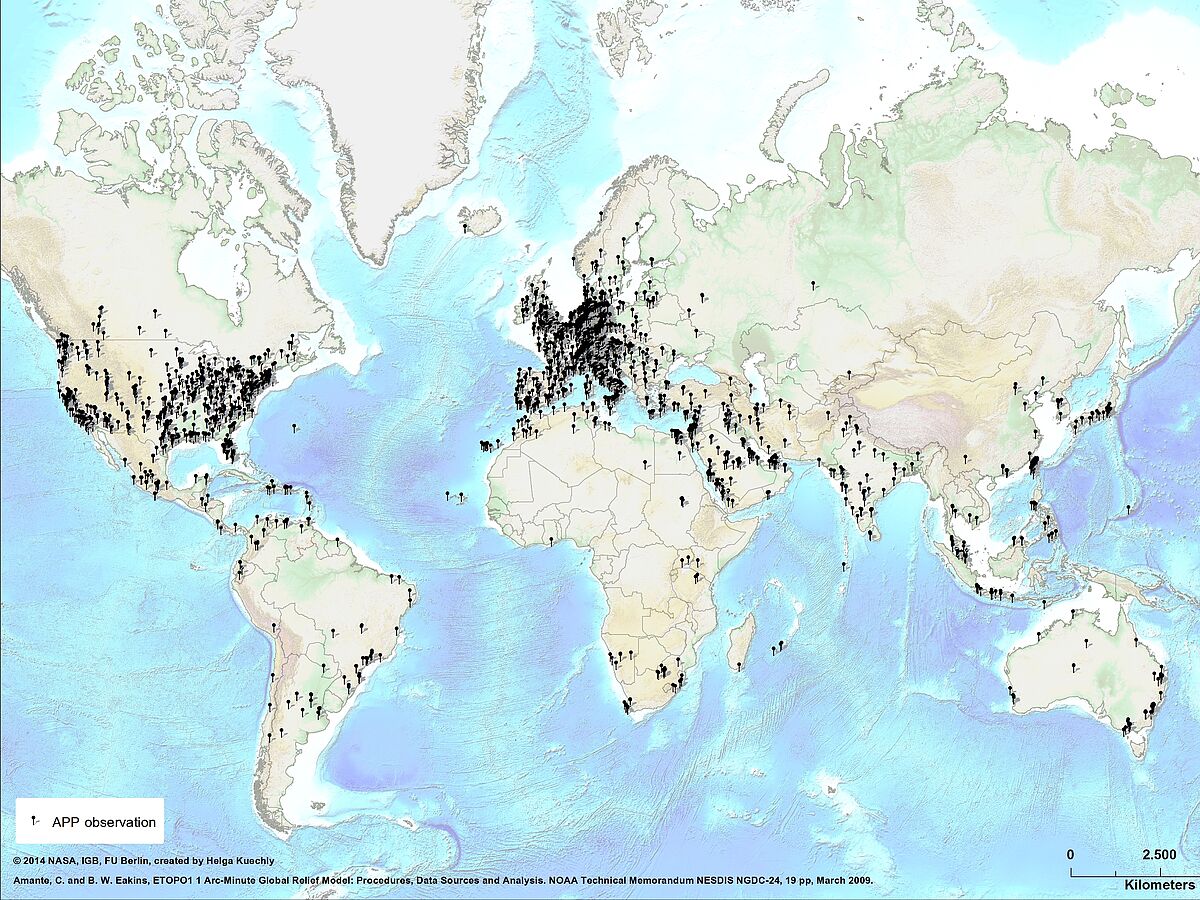In February the Loss of the Night app, which was developed by the Leibniz-Institute of Freshwater Ecology and Inland Fisheries (IGB), passed a major milestone: the 10,000th observation was submitted to the GLOBE at Night server by a citizen scientist. The app is funded by the Federal Ministry of Education and Research.
Researchers from the interdisciplinary project Loss of the Night want to understand light pollution on a worldwide scale. Since April, 2013 volunteer amateur scientists from around the world have been sending in their observations of skyglow. The app for Android smart phones allows participants to determine the number of visible stars in the night sky. In order to encourage participation from as many regions as possible, the app is available in eleven languages.
The aim of the project is to measure how the brightness of the sky is changing over time, as lighting technologies change and cities grow. “We want to understand changes in skyglow over many years” says Dr. Christopher Kyba of the Leibniz-Institute of Freshwater Ecology and Inland Fisheries in Berlin. “So we want people to come back to the same location in a future year and repeat their observation.”
 The app is used worldwide: Observations have been submitted from 111 different countries. So far, most of the data has come from Germany (45%) and the USA (15%), with other large contributions from Italy, France and Great Britain. Approximately 10% of the data comes from Asia, including by chance the 10,000th observation, which was submitted by a Japanese citizen scientist. “It's fantastic that so many people around the world are contributing to our project, and I hope that we'll continue to add new citizen scientists as the year rolls on”, says Kyba.
The app is used worldwide: Observations have been submitted from 111 different countries. So far, most of the data has come from Germany (45%) and the USA (15%), with other large contributions from Italy, France and Great Britain. Approximately 10% of the data comes from Asia, including by chance the 10,000th observation, which was submitted by a Japanese citizen scientist. “It's fantastic that so many people around the world are contributing to our project, and I hope that we'll continue to add new citizen scientists as the year rolls on”, says Kyba.
For scientific analyses, the researchers need observations of at least 7 stars taken during periods without twilight, moonlight, or clouds, and about 15% of the data satisfies these criteria. Most of the rest of the data is taken by users interested in trying out the app under non-ideal observing circumstances. The most convenient time of the month for measurements comes between the full and new moon, when the moon is not up during the early evening.
The app is an extension to the “GLOBE at Night” citizen science project, which has been running since 2006. It was developed in partnership with the firm Cosalux and is based on the widely used Google Sky Map application.
The app “Loss of the Night“ can be downloaded free of charge.
Country statistics:
The most common countries are: Germany 45%, USA
15%, Italy 5%, France 3%, Switzerland 2.3%, United Kingdom 2.2%, Austria
2.2%, Saudi Arabia 2%, Spain 1.7%
In terms of regions: Oceana 1.4%, Africa 2.2%, Asia 10%, Americas 19%, Europe 66%
About the app:
More information about the app is available on the Loss of the Night blog: lossofthenight.blogspot.com
About the “Loss of the Night” project:
http://www.verlustdernacht.de/about-us.html
http://www.GLOBEatNight.org
In
the interdisciplinary "Loss of the Night” research project, scientists
investigate the reasons for the increasing illumination of the night,
its ecological, cultural and socioeconomic effects, and the effects on
human health. The results of this research will help to develop improved
lighting concepts and sustainable technologies. Loss of the Night was
funded by the German Ministry of Education and Research and the Berlin
Senator for Economics, Technology and Research.
Contact:
| Dr. Christopher Kyba, Leibniz Institute of Freshwater Ecology and Inland Fisheries (IGB) / Freie Universität Berlin Phone: +49 (0)30 838-71140 E-Mail: christopher.kybawew.fu-berlin.de Dr. Franz Hölker, Leibniz-Institut für Gewässerökologie und Binnenfischerei (IGB) Phone: +49 (0)30 64 181 665 E-Mail: hoelkerigb-berlin.de |


